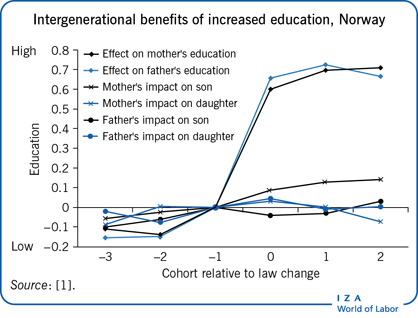Elevator pitch
Governments invest a lot of money in education, so it is important to understand the benefits of this spending. One essential aspect is that education can potentially make people better parents and thus improve the educational and employment outcomes of their children. Interventions that encourage the educational attainment of children from poorer families will reduce inequality in current and future generations. In addition to purely formal education, much less expensive interventions to improve parenting skills, such as parental involvement programs in schools, may also improve child development.
Key findings
Pros
The fact that better educated parents produce children who also do better implies that the benefits of policies to raise educational attainment are greater than previously estimated.
Simple measures to improve parenting skills can be effective and inexpensive—and be aimed at parents most in need of help.
Interventions that encourage the educational attainment of children from poorer families will reduce inequality in current and future generations.
The estimated payback from successful interventions in educational policy is greater if the focus is not only on the generation or groups directly affected.
Cons
The fact that children of better educated parents do better than children of less educated parents reduces social mobility across generations.
Some studies fail to find much evidence that expansions of education for one generation affect outcomes in the next generation.
Information is limited on returns to different types of schooling.
Estimates are conflicting on the relative importance of maternal and paternal education.
Little is known about the effects of expanding the educational system on intergenerational mobility.
